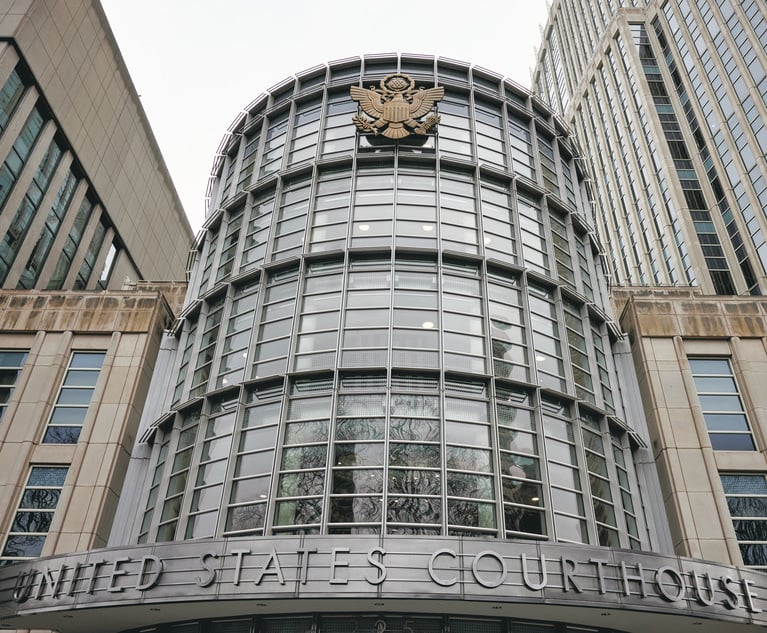Standing to Bring Consumer Data Beach Actions
In their Corporate Litigation column, Joseph M. McLaughlin and Yafit Cohn discuss the recent Second Circuit decision in 'Whalen v. Michaels Stores', in which the court held that the plaintiff in that consumer data breach action did not allege injury sufficient to satisfy the constitutional standing requirement.
June 07, 2017 at 02:03 PM
12 minute read
Corporate data breaches continue to proliferate and typically trigger consumer class action lawsuits alleging that the breach compromised the plaintiffs' personal and/or financial information. The threshold question in many of these consumer data breach actions is whether the consumer plaintiffs have plausibly alleged an actual harm sufficient to establish standing to sue in federal court under Article III of the Constitution.
Courts have recently reached different conclusions on this question, often relying on one or both of the U.S. Supreme Court's recent decisions on Article III standing, neither of which concerned data breach claims: Clapper v. Amnesty International USA,133 S. Ct. 1138 (2013) and Spokeo v. Robins. Spokeo, 136 S. Ct. 1540 (2016). Divergent holdings on standing in the data breach context sometimes reflect materially different facts, though they sometimes reflect varying applications of Supreme Court precedent to data breach cases—i.e., opposing views of the standard for actual injury or a reasonable risk of future harm sufficient to create standing to bring a data breach claim. Recently, the U.S. Court of Appeals for the Second Circuit weighed in on the standing question, holding in Whalen v. Michaels Stores that the plaintiff in that consumer data breach action did not allege injury sufficient to satisfy the constitutional standing requirement. 2017 WL 1556116 (2d Cir. May 2, 2017).
Supreme Court Standards
In the 2013 Clapper decision, the Supreme Court reiterated that under Article III, plaintiffs must establish standing to sue by demonstrating an injury that is “concrete, particularized, and actual or imminent; fairly traceable to the challenged action; and redressable by a favorable ruling.” Equally importantly, the opinion clarified that “'threatened injury must be certainly impending to constitute injury in fact,' and that '[a]llegations of possible future injury' are not sufficient.”
Clapper addressed whether the respondents had standing to assert a constitutional challenge to §702 of the Foreign Intelligence Surveillance Act, which authorizes the Attorney General and the Director of National Intelligence, after obtaining the approval of the Foreign Intelligence Surveillance Court, “to acquire foreign intelligence information by jointly authorizing the surveillance of individuals who are not 'United States persons' and are reasonably believed to be located outside the United States.” The respondents were “attorneys and human rights, labor, legal, and media organizations whose work allegedly requires them to engage in sensitive and sometimes privileged telephone and email communications with colleagues, clients, sources, and other individuals located abroad” whom respondents believed to be likely targets of surveillance. Seeking a declaration that §702 is unconstitutional and a permanent injunction against authorized surveillance under the provision, the respondents advanced two theories of standing. First, the respondents claimed that “they can establish injury in fact because there is an objectively reasonable likelihood that their communications will be acquired under [§702] at some point in the future.” Second, the respondents asserted that they were suffering present injury, because the substantial risk of surveillance under §702 has already impelled them “to take costly and burdensome measures to protect the confidentiality of their international communications.”
This content has been archived. It is available through our partners, LexisNexis® and Bloomberg Law.
To view this content, please continue to their sites.
Not a Lexis Subscriber?
Subscribe Now
Not a Bloomberg Law Subscriber?
Subscribe Now
NOT FOR REPRINT
© 2025 ALM Global, LLC, All Rights Reserved. Request academic re-use from www.copyright.com. All other uses, submit a request to [email protected]. For more information visit Asset & Logo Licensing.
You Might Like
View All
Big Tech and Internet Companies Slammed With Consumer Class Actions in December

GE Agrees to $362.5M Deal to End Shareholder Claims Over Power, Insurance Risks
2 minute read
'No Evidence'?: Big Law Firms Defend Academic Publishers in EDNY Antitrust Case
3 minute read
'Substantive Deficiencies': Judge Grants Big Law Motion Dismissing Ivy League Price-Fixing Claims
3 minute readTrending Stories
- 1The New Rules of AI: Part 2—Designing and Implementing Governance Programs
- 2Plaintiffs Attorneys Awarded $113K on $1 Judgment in Noise Ordinance Dispute
- 3As Litigation Finance Industry Matures, Links With Insurance Tighten
- 4The Gold Standard: Remembering Judge Jeffrey Alker Meyer
- 5NJ Supreme Court Clarifies Affidavit of Merit Requirement for Doctor With Dual Specialties
Who Got The Work
J. Brugh Lower of Gibbons has entered an appearance for industrial equipment supplier Devco Corporation in a pending trademark infringement lawsuit. The suit, accusing the defendant of selling knock-off Graco products, was filed Dec. 18 in New Jersey District Court by Rivkin Radler on behalf of Graco Inc. and Graco Minnesota. The case, assigned to U.S. District Judge Zahid N. Quraishi, is 3:24-cv-11294, Graco Inc. et al v. Devco Corporation.
Who Got The Work
Rebecca Maller-Stein and Kent A. Yalowitz of Arnold & Porter Kaye Scholer have entered their appearances for Hanaco Venture Capital and its executives, Lior Prosor and David Frankel, in a pending securities lawsuit. The action, filed on Dec. 24 in New York Southern District Court by Zell, Aron & Co. on behalf of Goldeneye Advisors, accuses the defendants of negligently and fraudulently managing the plaintiff's $1 million investment. The case, assigned to U.S. District Judge Vernon S. Broderick, is 1:24-cv-09918, Goldeneye Advisors, LLC v. Hanaco Venture Capital, Ltd. et al.
Who Got The Work
Attorneys from A&O Shearman has stepped in as defense counsel for Toronto-Dominion Bank and other defendants in a pending securities class action. The suit, filed Dec. 11 in New York Southern District Court by Bleichmar Fonti & Auld, accuses the defendants of concealing the bank's 'pervasive' deficiencies in regards to its compliance with the Bank Secrecy Act and the quality of its anti-money laundering controls. The case, assigned to U.S. District Judge Arun Subramanian, is 1:24-cv-09445, Gonzalez v. The Toronto-Dominion Bank et al.
Who Got The Work
Crown Castle International, a Pennsylvania company providing shared communications infrastructure, has turned to Luke D. Wolf of Gordon Rees Scully Mansukhani to fend off a pending breach-of-contract lawsuit. The court action, filed Nov. 25 in Michigan Eastern District Court by Hooper Hathaway PC on behalf of The Town Residences LLC, accuses Crown Castle of failing to transfer approximately $30,000 in utility payments from T-Mobile in breach of a roof-top lease and assignment agreement. The case, assigned to U.S. District Judge Susan K. Declercq, is 2:24-cv-13131, The Town Residences LLC v. T-Mobile US, Inc. et al.
Who Got The Work
Wilfred P. Coronato and Daniel M. Schwartz of McCarter & English have stepped in as defense counsel to Electrolux Home Products Inc. in a pending product liability lawsuit. The court action, filed Nov. 26 in New York Eastern District Court by Poulos Lopiccolo PC and Nagel Rice LLP on behalf of David Stern, alleges that the defendant's refrigerators’ drawers and shelving repeatedly break and fall apart within months after purchase. The case, assigned to U.S. District Judge Joan M. Azrack, is 2:24-cv-08204, Stern v. Electrolux Home Products, Inc.
Featured Firms
Law Offices of Gary Martin Hays & Associates, P.C.
(470) 294-1674
Law Offices of Mark E. Salomone
(857) 444-6468
Smith & Hassler
(713) 739-1250






